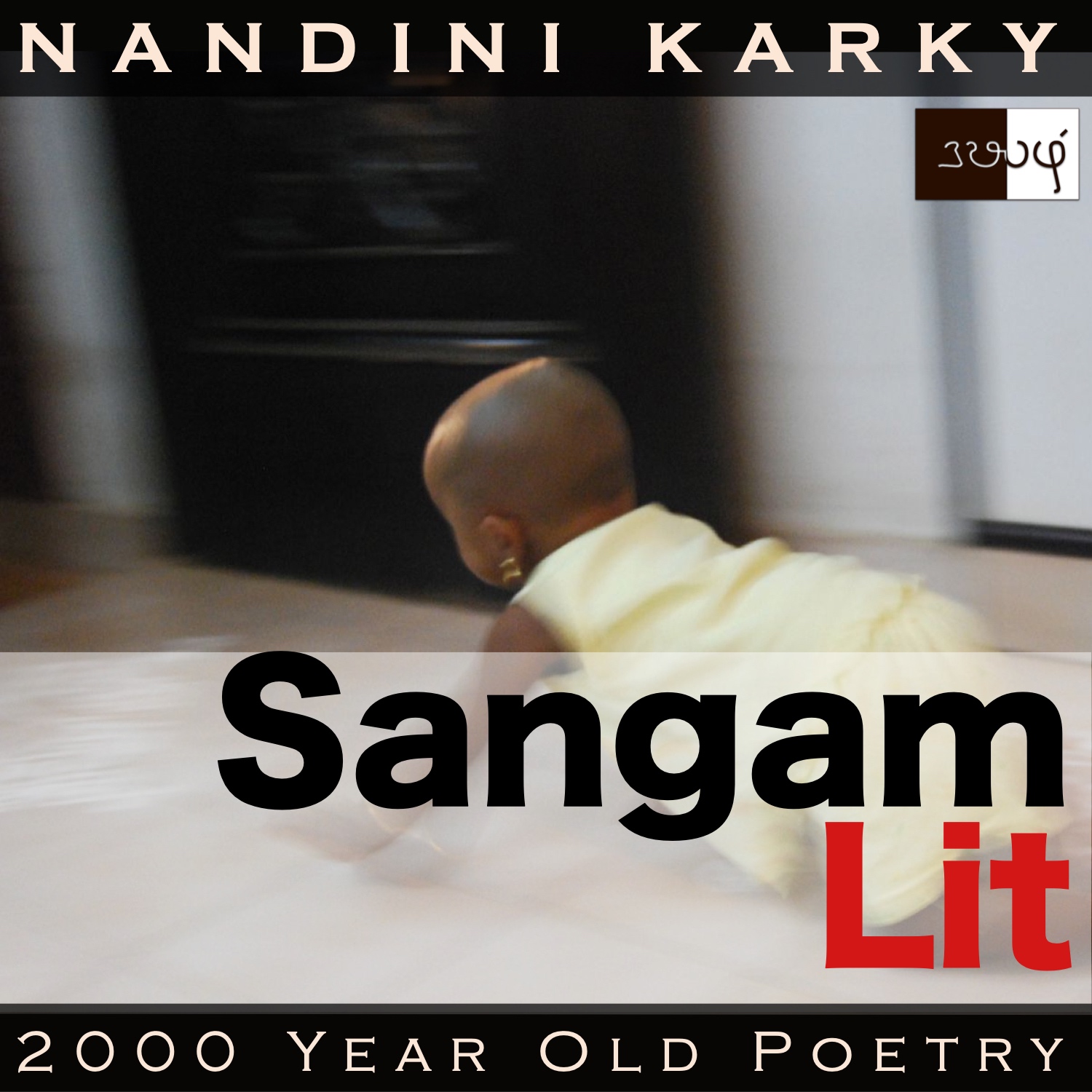Podcast: Play in new window | Download
Subscribe: Apple Podcasts | Spotify | Amazon Music | Android | iHeartRadio | TuneIn | RSS | More

In this episode, we delight in the anticipated joy, glowing in the heart of a man returning home, as depicted in Sangam Literary work, Natrinai 221, penned by Idaikaadanaar. The verse is set in the forest country of ‘Mullai’ and speaks in the voice of the man to his charioteer, bidding him to hasten homeward.
மணி கண்டன்ன மா நிறக் கருவிளை
ஒண் பூந் தோன்றியொடு தண் புதல் அணிய,
பொன் தொடர்ந்தன்ன தகைய நன் மலர்க்
கொன்றை ஒள் இணர் கோடுதொறும் தூங்க,
வம்பு விரித்தன்ன செம் புலப் புறவில்,
நீர் அணிப் பெரு வழி நீள் இடைப் போழ,
செல்க-பாக!-நின் செய்வினை நெடுந் தேர்:
விருந்து விருப்புறூஉம் பெருந் தோட் குறுமகள்,
மின் ஒளிர் அவிர் இழை நல் நகர் விளங்க,
நடை நாட் செய்த நவிலாச் சீறடிப்
பூங் கட் புதல்வன் உறங்குவயின் ஒல்கி,
”வந்தீக, எந்தை!” என்னும்
அம் தீம் கிளவி கேட்கம் நாமே.
The poem begins with a luminous start as in ‘மணி கண்டன்ன’ meaning ‘looking akin to sapphires’. This is followed by ‘மா நிறக் கருவிளை’ meaning ‘dark-coloured butterfly pea flower’. Shortly thereafter, there’s another flower in ‘தோன்றி’ or the ‘flame-lily’, spreading red on the verse. The sapphire reference in the first line is complemented by reference to ‘gold’ in the words ‘பொன் தொடர்ந்தன்ன’ meaning ‘akin to a string of gold coins’. The poet is perhaps employing the technique of subliminal perception so as to induce his patron to shower him with sapphires and gold. Moving on, we find that the reference to that yellow metal is to present a simile for the flowers of the ‘கொன்றை’ or ‘golden shower tree’. The phrase ‘விருந்து விருப்புறூஉம் பெருந் தோட் குறுமகள்’ would be interpreted wrongly today to mean ‘a wide-shouldered girl who desires feasts’. But here, it talks about the fervent wish of a Sangam woman to be hospitable and render delectable feasts to guests who arrive home. The phrase ‘நவிலாச் சீறடி’ brings forth the ‘unsteady steps’ of a toddler who’s learning to walk. The verse ends with ‘தீம் கிளவி கேட்கம் நாமே’ meaning ‘let us hear the sweet words’. Shall we join too?
The man and lady have been leading a happy married life when the time comes for the man to part with the lady on a mission, perhaps to aid a king in war or to earn wealth. He finishes the mission successfully and then, his mind turns towards the lady waiting for his return. He turns to his charioteer and says, “Looking like sapphires, bloom the dark-hued ‘karuvilai’ along with the bright ‘thondri’ flowers decorating the cool bushes. As if gold coins have been strung together, hang the fine flowers of the ‘kondrai’ in radiant clusters all along the branches, spreading fragrance on the red earth of the forest country. On this long path adorned with moisture, ride your tall and sturdy chariot, splitting the ground into two, O charioteer! My son, who wears radiant jewels, brightens our fine mansion, rendering streaks of light akin to lightning, as he learns to walk with unsteady steps. My lady, the one who wishes to render her hospitality unto guests, the young lady with wide shoulders, moves softly near my flower-eyed son, who lies asleep, and says ‘Come to me, my lord’. To hear those sweet words, let us hasten, O charioteer!” With these words, the man visualises the scenes at his home far away and expresses the eager desire in his heart to be with his lady and son.
The man first describes the forest land he’s traversing, bringing forth incandescent images of the blooming ‘karuvilai’, ‘thondri’ and ‘kondrai’, splashing the hues of blue, red and yellow on that land. What a celebration with colours and flowers! Then, he conveys the core message to his charioteer asking the man to ride so fast on that moisture-laden path so that it splits into two. Imagine the speed the man must take to make this happen! The man then talks about how in his home, he sees his young son, who’s just learning to walk, take those unsteady steps and making his home entire flash with the glow of his anklets and armlets. Then, he brings to mind his dutiful, devoted lady, who loves to serve feasts for her guests. He then sees his young lady step near his sleeping son and say words of endearment to wake him up. The man urges the charioteer to rush so that he can delight in those sweet words of the lady!
How romantic indeed, to see such love in this relationship glow long after marriage and childbirth too! The intensity in the man’s desire to be home is evident when the man asks the charioteer to split the road into two. It brings to mind thoughts of how one rushes to a beloved, after a separation, not minding the world around. Personally, I’m reminded of the time I almost ran a trolley into the lady ahead of me, as I was rushing out of the airport to meet a special someone after a long separation! So, no surprise that the man wants to quake the earth as he rushes homeward. The incomparable joy of seeing a child grow, and the love a mother showers on her toddler, is captured in this verse, which seems to step on one’s heart with the joyous patter of a baby’s feet!




Share your thoughts...